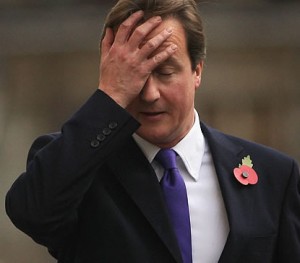The Utter Ridiculousness of David Cameron’s Proposed London Riot Social Media Ban
In a move somewhere on par with rearranging the deck chairs as the Titanic sinks, UK Prime Minister David Cameron has floated the idea of banning people suspected of organizing or participating in the London riots from social media. {Mashable} Since having more police than rioters is an idea that didn’t occur to anyone until four days of disorder and destruction had passed, and it’s easier to blame BlackBerry.
 Besides being of questionable legality, there are a number of common sense problems here.
Besides being of questionable legality, there are a number of common sense problems here.
For one, while BlackBerry may have been the preferred communication device among protesters, news of and plans for riots largely spread to Twitter and more public channels. Public channels that police could easily monitor to determine where outbreaks of violence might occur next, to better coordinate their efforts. Even on BlackBerry’s network, there’s nothing to suggest that police who may have had BlackBery devices themselves were banned or restricted from accessing more open forum posts, or submitting their own numbers to organizers looking to rally as many people as they could.
The most secure BlackBerry messages – ones with end-to-end encryption are typically not even available to users not on the type of enterprise plan normally used by large companies and government. {Deutsch Welle} So if everyone else is sending messages that can be unencrypted by any other BlackBerry device, would it not make more sense to simply buy the police department a few BlackBerry handsets so that they could monitor chatter on the network?
That’s to say nothing of more open networks like Twitter or Facebook, who are also coming under fire.
So instead of oh, say, putting a few tech savvy officers on the networks to create profiles, and monitor and potentially engage people suspected of plotting criminal activity, you instead shut down their profiles, forcing them to move to secondary accounts which are further under the radar, or onto methods that are more difficult to monitor, like in person conversations.
Then you not only have plots that are more difficult to trace, but less evidence to actually prosecute people with as well.
Brilliant.
Say what you will about their ethics, but maybe we should get News Corp. on this – they seem to be the one London organization who can figure out how to monitor a person and gather information. A group of anonymous UK residents (ex-News of the World?) created Zavilia.com, a site that uses Facebook to get photos of rioters, and has crowd sourced identification of people in the pictures. Once multiple IDs come in on the same person, the name is forwarded to police. Some particularly bold rioters are posting photos of themselves with their loot on social networks, sites where they can sell the merchandise and doing other things online that are easily traceable and identifiable. All this to say that if a random developer with a few spare hours can figure out how to use social media to identify and potentially stop looters, fame seeking criminals with more braggadocio than criminal genius are openly posting photos, surely the entire UK government can figure out how to prevent and prosecute crimes with the help of social media, not in spite of it.
While there is a real need to review the plans for dealing with sudden and unexpected outbursts of criminal activity, Mr. Cameron’s anti-social media strategy is unlikely to have any real effectiveness within it. BBMs don’t cause criminal activity, for all the credit they’ve received, neither Twitter or Facebook caused revolutions. They may facilitate the planning, but for both good and bad, killing a communication method doesn’t kill the spirit behind the messages.
